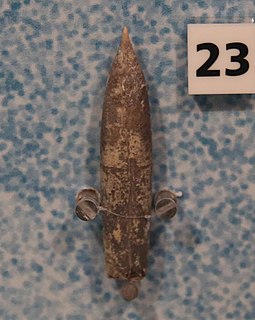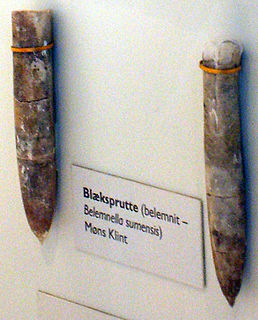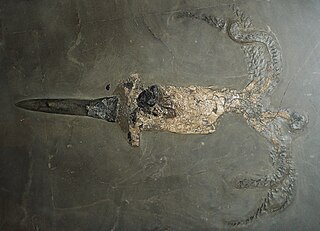| Belemnopsis | |
|---|---|
 | |
| Scientific classification | |
| Kingdom: | Animalia |
| Phylum: | Mollusca |
| Class: | Cephalopoda |
| Superorder: | † Belemnoidea |
| Genus: | † Belemnopsis |
Belemnopsis is a genus of belemnite, an extinct group of cephalopods. [1]
| Belemnopsis | |
|---|---|
 | |
| Scientific classification | |
| Kingdom: | Animalia |
| Phylum: | Mollusca |
| Class: | Cephalopoda |
| Superorder: | † Belemnoidea |
| Genus: | † Belemnopsis |
Belemnopsis is a genus of belemnite, an extinct group of cephalopods. [1]
Eobelemnites is a genus of belemnite from the Mississippian Epoch.

Actinocamax is a genus of belemnite, an extinct group of cephalopods.
Aulacoceras is a genus of belemnite, an extinct group of cephalopods.

Belemnella is a genus of belemnite, an extinct group of cephalopods.
Breviatractites is a genus of belemnite, an extinct group of cephalopods.
Brevibelus is a genus of belemnite, an extinct group of cephalopods.
Chondroteuthis is a genus of belemnite, an extinct group of cephalopods.
Conoteuthis is a genus of belemnite, an extinct group of cephalopods.
Dictyoconites is a genus of belemnite, an extinct group of cephalopods.
Diplobelus is a genus of belemnite, an extinct group of cephalopods.
Gonioteuthis is a genus of belemnite, an extinct group of cephalopods. It grew to a body length of 8 inches and fed on small marine animals. Fossils of Gonioteuthis have been found in the Netherlands, Germany, and Sweden in rocks dated to the late Cretaceous Period, specifically 85 to 70 million years ago.

Hibolites is a genus of belemnite, an extinct group of cephalopods.

Neohibolites is a genus of belemnite, an extinct group of cephalopods.
Parapassaloteuthis is a genus of belemnite, an extinct group of cephalopods.

Passaloteuthis is a genus of belemnite, an extinct group of cephalopods. Belemnites are typically known for having about 40 micro-hooks on each one of its appendage. However, Passaloteuthis is notable for being associated with a pair of mega-hooks known as onychites. These hooks are tentatively interpreted as male-specific features, though their exact function is still unknown.
Permoteuthis is a genus of belemnite, an extinct group of cephalopods.
Produvalia is a genus of belemnite, an extinct group of cephalopods.
Pseudobelus is a genus of belemnite, an extinct group of cephalopods.

Belemnitida is an extinct order of squid-like cephalopods that existed from the Late Triassic to Late Cretaceous. Unlike squid, belemnites had an internal skeleton that made up the cone. The parts are, from the arms-most to the tip: the tongue-shaped pro-ostracum, the conical phragmocone, and the pointy guard. The calcitic guard is the most common belemnite remain. Belemnites, in life, are thought to have had 10 hooked arms and a pair of fins on the guard. The chitinous hooks were usually no bigger than 5 mm (0.20 in), though a belemnite could have had between 100 and 800 hooks in total, using them to stab and hold onto prey.

Belemnites is a genus of an extinct group of cephalopods belonging to the order Belemnitida. These cephalopods existed in the Early Jurassic period from the Hettangian age to the Toarcian age (175.6–183.0). They were fast-moving nektonic carnivores.